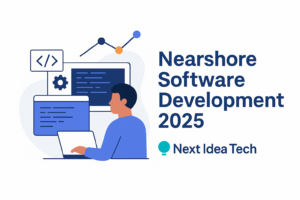As you probably already know, Ruby is a full-stack software development framework. It can be used to build web applications, eCommerce stores, and mobile apps. In fact, it’s the most popular open-source web application right now. There are several well-known companies that use Ruby On Rails to code and design their websites. A few of them are Shopify, GitHub, Twitch, Kickstarter, ConvertKit, and Zendesk.
Hire the best developers in Latin America. Get a free quote today!
Contact Us Today!With so many tech giants taking advantage of this stack, it’s only natural if you also want to give it a try. But hiring Ruby developers can be a challenge for companies outside the tech industry or those new to this programming language, especially when it comes to the interview process. That’s why we decided to show you the top Ruby interview questions so you can hire the right developers for your organization.
What does a Ruby developer do?

The rise of eCommerce stores made Ruby a top programming language that’s used for all sorts of online stores, blogs, and portfolios. Many websites are built with this framework, increasing the demand for IT professionals well-versed in this language. Moreover, Ruby developers are increasingly booked because of their versatile development skills.
Because it is a full-stack programming language, Ruby is perfect for both back-end and front-end development projects. It allows Ruby developers to create the two sides of a development task – server-side and user-side. This means Ruby On Rails developers can describe themselves as full-stack programmers. As full-stack developers, many US-based and international companies are looking for the top Ruby professionals in the market.
Top Ruby Interview Questions
Basic Ruby interview questions:
1. How many types of variables are used in Ruby and what are they?
2. What are the levels of access control for Ruby methods?
3. How many different class libraries are used in Ruby?
4. Explain the Active Record pattern.
5. Why is Ruby known as a flexible programming language?
Intermediate Ruby interview questions:
1. What is the difference between a Ruby class and a module?
2. Explain the case statement in Ruby.
3. What are the four Ruby variables?
4. Explain the difference between Page, Action, Fragment, Low-Level, and SQL caching types.
5. How is Ruby different from Java?
Advanced Ruby interview questions:
1. How many iterators are used in Ruby?
2. Describe cross-site request forgery, cross-site scripting, session hijacking, and session fixation attacks.
3. What is lambda Ruby?
4. How does interpolation work in Ruby?
5. Explain the difference between nil and false in Ruby.
Ruby on Rails Ruby interview questions:
1. What is a Rails engine?
2. Explain what Object-Relationship-Model means in Rails.
3. What are the positive aspects of Rails?
4. When does Rails triggers an Ajax Operation?
5. What are Rails Migrations?
How to hire Ruby developers
Because Ruby developers have a strong command of both back-end and front-end technologies and this programming language is highly popular, Ruby professionals are hard to book. Many of them have extremely limited availability or are after a full-time job at one of the tech giants. So how can US-based businesses hire Ruby developers in such a competitive market? Nearshore IT staff augmentation is the answer.
At Next Idea Tech, we offer staff augmentation and direct placement services that let you hire nearshore developers within a record timeframe. We handle the recruitment process, all payments, and keep track of the developer’s progress. With a global pool of Ruby developers to choose from, you will surely find the IT professional you’re looking for.
We can help you hire top Ruby developers who work from a nearshore location. These nearshore Ruby developers are mostly located in Latin America, sharing time zones with the US and allowing for real-time collaboration. That’s why we offer staff augmentation and direct placement services to help US-based businesses hire Ruby developers at the best rates in the market. Our nearshore Ruby developers come from an international network of experienced IT professionals, making it easier for you to pick the perfect fit for your company. Contact us today to learn more about our services!




